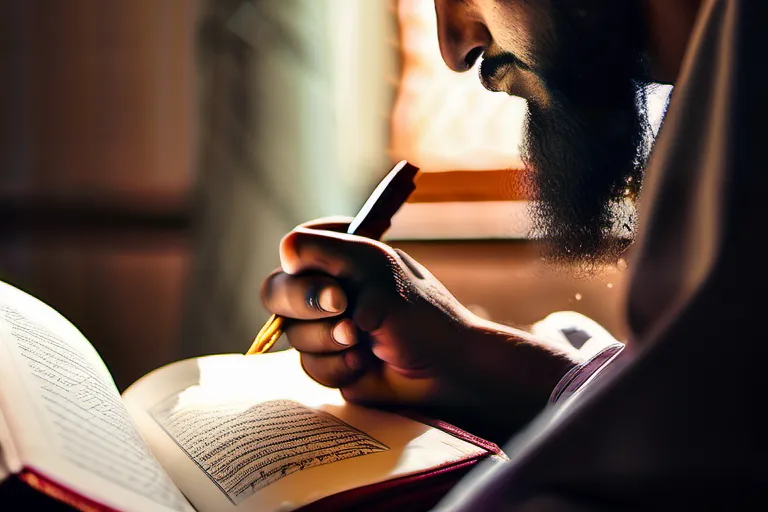Exploring the Importance, Process, and Benefits of Memorizing the Holy Quran
In this comprehensive article, we delve into the profound practice of memorizing the Quran among Muslims. We will explore its historical significance, the process involved, and the numerous benefits it offers to those who embark on this spiritual journey.
The Historical Significance of Memorizing the Quran
The Historical Significance of Memorizing the Quran
Imagine a time when scrolls were rare and precious, guarded jealously by scribes and scholars. In that era, the Quran, the word of Allah revealed to Prophet Muhammad (PBUH), was not only recited but also memorized verbatim by his companions. This act of memorization became more than just a practice; it transformed into a sacred duty, a living testament passed down through generations.
Why did Prophet Muhammad (PBUH) place such importance on memorizing the Quran? Wasn’t the written word enough? The answer lies in the very nature of revelation. Memorization ensured that the message remained intact and pure, free from any human alteration or error. It was as if the words themselves were engraved into the minds of believers, ready to be recited at a moment’s notice.
During his lifetime, Prophet Muhammad (PBUH) emphasized this practice by encouraging his followers to commit parts of the Quran to memory. He said, ‘Whoever memorizes ten verses from the Quran will be rewarded as if he had set up a freed slave’ (Hadith reported in Sahih al-Bukhari and Muslim). This statement underscores the significant role that memorization played within the community of believers.
The act of memorizing the Quran was not merely about rote learning; it involved deep understanding and internalization. Each verse, each word, became a part of one’s soul, shaping their beliefs and behaviors. It is said that when Prophet Muhammad (PBUH) would recite a verse, he would pause for reflection, allowing the meaning to resonate within his community.
Thus, in the early days of Islam, memorizing the Quran was not just an academic exercise but a spiritual journey. It allowed believers to carry the message of Allah wherever they went, ensuring that the light of guidance would never be extinguished. This practice has continued to this day, with millions of Muslims worldwide dedicated to preserving and passing on the words of Allah.
The historical significance of memorizing the Quran lies in its ability to bridge generations, connecting us directly to the Prophet Muhammad (PBUH) and the message he conveyed. It is a living link that transcends time, making each recitation not just a remembrance but a living embodiment of faith.
In exploring the historical context of memorizing the Quran, we uncover a profound practice that continues to shape Islamic tradition and spirituality. The next chapter will delve into the process of learning this sacred text, from the first steps in mastering Arabic to the deep understanding required for true memorization.
The Process of Memorizing the Quran
The process of memorizing the Quran, known as hifz, is akin to planting a seed that will grow into a tree of knowledge and faith. From learning the Arabic script to reciting and understanding its meaning, every step is crucial for a Muslim seeking to internalize this sacred text.
Firstly, one must embark on the journey by acquiring proficiency in alif-lam, the foundational alphabet of the Arabic language. This is not just about recognizing letters but understanding their nuances and pronunciations, much like mastering the notes before playing a melody on an instrument. The repetition here is key; it’s akin to building muscle memory for athletes, ensuring that each letter flows naturally into the next.
Once comfortable with the script, the next step involves tajweed, or correct recitation. Here, one learns how to give life to the words through proper intonation and articulation. It’s like adding vibrancy to a dull picture—each word resonates more deeply when pronounced correctly. This process isn’t just about following rules; it’s about connecting with the text on a spiritual level.
Understanding the meaning of the Quran comes next, which involves reading commentaries and translations. This step is vital because without comprehension, recitation can become mechanical. It’s like reading a novel where you don’t understand the plot or characters—it lacks depth. By grasping the essence of each verse, one transforms passive memorization into an active engagement with divine wisdom.
Finally, constant practice and repetition are essential to reinforce what has been learned. This ongoing process is like watering a garden daily; it ensures that the plants thrive and bear fruit. Regular recitation in the presence of a teacher or through self-study helps refine one’s understanding and pronunciation, making the Quran come alive with each read.
Memorizing the Quran isn’t just about committing verses to memory; it’s about internalizing its teachings and applying them to daily life. It’s a journey that enriches not only the mind but also the soul, providing guidance and comfort in times of need. So, why wait? Begin this beautiful process today and let the Quran become an integral part of your faith.
The Benefits of Memorizing the Quran
Imagine delving deep into a treasure chest filled with wisdom, guidance, and divine revelations—this is what memorizing the Quran feels like for many Muslims. The Quran serves as more than just a book; it’s a spiritual lifeline that guides believers through life’s challenges and strengthens their faith. By committing its verses to memory, Muslims not only preserve these teachings but also internalize them, making them a part of their daily lives.
Memorizing the Quran is like planting seeds in fertile soil; over time, they grow into robust trees that bear fruit. These seeds are the words of Allah, and when memorized, they sprout into faith, hope, and love within a person’s heart. This process transforms not just one’s understanding but also their character, making them more patient, compassionate, and righteous.
But why stop at spiritual benefits? The Quran is a beacon of knowledge as well. Memorizing it provides a profound intellectual journey, enriching the mind with its rich linguistic structure and deep theological insights. It fosters critical thinking, enhancing one’s ability to analyze complex issues from an Islamic perspective. This knowledge can be applied not only in religious contexts but also in personal decision-making and societal interactions.
Moreover, the act of memorizing the Quran is a communal effort. Families often come together to recite and learn its verses, creating bonds that last a lifetime. These shared experiences are more than just learning; they are moments of unity and spiritual upliftment. Each verse learned becomes a piece in the intricate mosaic of one’s faith, shaping their identity and guiding them through life’s trials.
So, as you embark on this journey, remember that every word memorized is a step closer to understanding the divine will. It’s not just about reciting; it’s about living by its teachings. The Quran is like a compass, always pointing towards truth and righteousness. By memorizing it, you are not only enriching your spiritual life but also contributing to the greater good of humanity.
In essence, the benefits of memorizing the Quran are multifaceted—spiritual, emotional, intellectual, and communal. Each benefit intertwines to create a rich tapestry that nourishes the soul and guides the heart towards Allah’s pleasure. So, why not begin this journey today? The rewards await those who seek them.
- Strengthening Faith: Committing the Quran to memory solidifies one’s belief in its teachings and divine guidance.
- Improving Character: Reciting verses repeatedly enhances moral virtues, making a person more patient, compassionate, and righteous.
- Enhancing Understanding: Memorization deepens knowledge of the Quranic text, leading to better comprehension and application in daily life.
- Creating Bonds: Family recitations foster unity and spiritual connections within the community.
By embracing this journey, you open doors to a profound and enriching experience that will undoubtedly shape your life for the better. The path of memorizing the Quran is one of discovery, growth, and transformation. Are you ready to embark on it?
The Role of Memorizing the Quran in Islamic Education
The role of memorizing the Quran in Islamic education is profound and multifaceted, much like the roots of a mighty tree that anchor it firmly to the ground. How many parents have wished their children could grow up to be scholars of the faith, reciting from memory the words of Allah? When we consider the significance of memorizing the Quran in Islamic education, we are essentially exploring how this act shapes not just individuals but entire communities.
From early childhood to adulthood, the process of memorizing the Quran is a journey that begins with simple verses and grows into an extensive knowledge of its profound meanings. It’s like planting seeds in the fertile soil of young minds; over time, these seeds blossom into strong, resilient roots that nourish and sustain the soul.
Memorizing the Quran shapes Muslim identity by embedding the core beliefs and values deeply within one’s heart and mind. This internalization is akin to wearing a cloak that protects against adversity, offering comfort in times of distress and guidance during moments of confusion. It’s about more than just reciting words; it’s about embodying the teachings of Islam.
Moreover, the spiritual growth derived from memorizing the Quran is immeasurable. It’s like walking through a forest and feeling the air change with each step, growing closer to the essence of the divine. As one progresses in their memorization, they develop a deeper connection to Allah, fostering a sense of belonging and purpose that transcends daily life.
The impact on personal character is equally transformative. The Quran’s wisdom shapes behavior and attitudes, promoting virtues such as compassion, honesty, and justice. These values become second nature, guiding actions in both public and private spheres. It’s like having a map that shows the path to righteousness, ensuring every step one takes aligns with the will of Allah.
In essence, memorizing the Quran is not just an educational tool but a life-changing experience that enriches every facet of a Muslim’s existence. It’s about more than mastering a text; it’s about becoming a better person and contributing to a better community. As we delve deeper into this process, we realize its true significance lies in the transformation it brings to those who undertake it.
The Impact of Memorizing the Quran on Society
The impact of memorizing the Quran on society is profound and far-reaching, touching every aspect of life within Muslim communities worldwide. Could it be that memorizing the Quran is not just a personal spiritual journey but also a powerful societal glue? When individuals commit to memorizing this holy book, they are not merely absorbing its verses; they are becoming active participants in maintaining the fabric of their community’s moral and ethical standards.
Unity and Harmony: The Quran teaches us about unity and compassion. How can we expect society to be cohesive when its members do not share a common set of values and principles? Memorizing the Quran ensures that these values are deeply ingrained in every member, fostering an environment where everyone strives for peace and understanding. This collective effort towards shared knowledge and beliefs is what makes societal unity more than just a slogan—it becomes a lived reality.
Isn’t it remarkable how memorizing the Quran can also serve as a powerful tool against extremism? By deeply internalizing its teachings, individuals are better equipped to recognize and resist interpretations that deviate from its true essence. This internalization leads to a more balanced and moderate approach in interpreting religious texts, which is essential for maintaining peace within communities.
Educational Role: Beyond personal spiritual growth, the process of memorizing the Quran plays a crucial role in education. It instills discipline, memory skills, and a deep respect for knowledge. These qualities are not just beneficial in religious studies but also in all other fields of learning. As children memorize verses from an early age, they develop a strong foundation that supports their overall intellectual development.
Can we imagine a society where every member has a solid understanding of the Quran? Such a scenario would undoubtedly lead to a more informed and ethical community, capable of making wise decisions based on principles derived directly from the holy book. This collective knowledge is a beacon of light in dark times, guiding societies towards justice and righteousness.
In conclusion, memorizing the Quran is not merely an individual act; it is a communal responsibility that contributes significantly to societal well-being. From fostering unity and peace to enhancing educational standards, its impact resonates throughout every facet of life. Could there be anything more important than ensuring this practice thrives for generations to come?
The Future of Memorizing the Quran
The future of memorizing the Quran is at our fingertips, literally! As we step into this digital age, how can we ensure that the sacred practice of memorization remains alive and vibrant for generations to come? In a world where technology is seamlessly woven into every aspect of life, it’s crucial to explore innovative teaching methods that embrace these advancements without losing sight of tradition.
Imagine a classroom where young minds are not only taught through traditional methods but also through interactive digital platforms. How can we leverage the power of apps and software designed specifically for memorizing the Quran? These tools could provide instant feedback, personalized learning paths, and engaging multimedia content that make the process more enjoyable and effective.
The use of technology in this sacred practice is not just about convenience; it’s a way to preserve and enhance the purity of the knowledge. Just like how a gardener nurtures a seedling into a towering tree, these tools can help nurture young minds as they delve deep into the Quranic text. The key question remains: How do we ensure that technology serves as an aid rather than a distraction?
Moreover, virtual classrooms and online platforms could bridge geographical gaps, allowing students from diverse backgrounds to connect and learn together. This could foster a global community of memorizers who share experiences and support each other, making the practice even more meaningful.
Innovative teaching methods can also include gamification elements that make learning fun and competitive. By setting challenges and creating leaderboards, students might be motivated to reach new levels of proficiency. This approach not only enhances memorization but also instills a sense of community and collective achievement.
The future is here, and it’s time to embrace these changes with open hearts and minds. How can we harness technology to preserve the legacy of our ancestors while ensuring that this sacred practice continues to thrive in the modern era? The answer lies in our commitment to innovation and tradition, weaving them together like threads in a tapestry.
Let’s embark on this journey with hope and determination, knowing that every step we take towards digital memorization is a step towards safeguarding one of Islam’s most cherished practices. Will you join me in this endeavor? The future of the Quranic memorization lies in our hands!
Conclusion
 By understanding the importance, process, and benefits of memorizing the Quran, we gain a deeper appreciation for this sacred practice that binds Muslims together in their faith.
By understanding the importance, process, and benefits of memorizing the Quran, we gain a deeper appreciation for this sacred practice that binds Muslims together in their faith.











